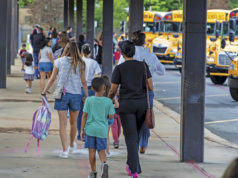Take control of your future — and help your kids with theirs — through free online tools from local credit unions.
By Cory Sekine-Pettite
Most of us learned about money on our own. Think about it: No one taught us about finances, budgeting, or saving for retirement unless we asked — or paid — someone for help. And in many cases, when we’ve asked for assistance it was because we already were in over our heads. Typically, our school systems neglect these subjects, and families don’t talk about money because — let’s face it — the average American household isn’t good about spending or saving money. So parents either avoid the topic or just don’t think they’re qualified to educate their children on the basic principles of managing money.
Many of our mistakes when it comes to finances are avoidable; we just need to be taught the skills. This may sound daunting, but it really isn’t. You can break the cycle of financial illiteracy with your children. There’s no shame in seeking outside support. In fact, you should. And two local companies offer a wealth of knowledge and experience to help you and your kids learn how to navigate the banking system, to invest, to save for retirement, plan for home ownership, and much more. Both LGE Community Credit Union and Credit Union of Georgia offer a plethora of online financial education tools geared toward children and young adults. We spoke with both companies about their programs.
Credit Union of Georgia
The Credit Union of Georgia, through programs such as its Cuga Kid’s Club, offers both online financial education for parents and kids, as well as customized courses for elementary to high school students that teachers can arrange with the company. Additionally, it offers bank accounts that are specifically designed for children and young adults. These members receive rewards for saving, achieving good grades, celebrating a birthday, attending a Cuga Kid’s Club event (which, for now, are held online), and more. A Kid’s Club account can be opened for just $10.
“This is a great tool to teach children about the benefits of savings,” said Amanda Arnold, VP of marketing & business development at Credit Union of Georgia. She added that the company originally was founded by educators for educators, so they know that teachers (and parents) need tools to help kids learn about bank accounts, budgeting, loans, getting ready for college, and more.
Credit Union of Georgia was founded in 1960 to serve local teachers and school employees. It is a not-for-profit institution, which means that earnings go right back into member programs and services. The credit union offers seven branch locations, as well as multiple shared branches and shared ATMs.
The institution’s online educational programs include topics such as Credit Reports and Scores, Budgeting Basics, Home Buying, and Auto Buying. Plus, there is a wealth of blog posts, webinars, and other resources for anyone looking to further their financial education.
Anyone interested in taking advantage of these educational tools can do so. One does not need to be a member of the credit union. The free resources are available at CUofGA.org. It is easy to get started, so don’t delay. “We feel it is important for parents to be involved. Parents can share their stories and they can learn from one another,” Arnold said.
Educators, if you invite a Credit Union of Georgia rep to teach a class, which for the time being are being completed via Zoom, you can expect a tailored experience catered to the needs of your chosen financial education topic, Arnold said. The presentation would be taught by a knowledgeable financial professional with hands-on activities and information, and tools to help students further their education on finances. Reach out to the marketing department at marketing@CUofGA.org to request someone for a financial literacy class. Credit Union of Georgia serves those who live or work in Cobb, Cherokee, Fulton, Paulding, Bartow, Douglas, and Gilmer counties.
LGE Community Credit Union
LGE launched a series of online financial education programs last year to help everyone better manage their money. “We’ve always known there was a need for financial education within our community and our community relations team has done countless in-person financial education presentations for schools and businesses,” said Rebecca Duvall, marketing manager at LGE. “When the pandemic hit and people were spending a lot of time at home (and many experiencing financial stress), we knew it was imperative that our members — and the community — had access to online content to help navigate them through not only these unprecedented times, but their whole financial journey.”
LGE has been doing just that — helping people through their ‘whole financial journey’ — since 1951 when a group of Lockhead Georgia employees sought to establish a better way to bank. Today, LGE serves communities in Northwest Georgia as a not-for-profit financial institution. Unlike a bank, whose profits go to its shareholders, LGE’s profits go to its members in the form of better rates and lower fees. And no, you don’t have to be a Lockhead employee to join. Everyone who lives or works in Bartow, Cherokee, Cobb, Fulton, and Paulding counties is eligible to apply for membership. And with 13 full-service LGE locations in our area, and access to more than 48,000 shared ATMs nationwide, you won’t have trouble finding a spot to do most of your banking.
Membership may have privileges that LGE reps would be happy to discuss, but the company’s Financial Education Center tools are free to use by anyone. The online service is easy to navigate and includes quick-link options for resources on Financial Wellness 101, Banking Basics, Lending Basics, Homeownership, Investing in Your Future, Retirement Planning, and Financial Caregiving. There’s also an option to create your own “personalized playlist” based on your financial needs and goals. Duvall said users can expect short, easy-to-use modules with interactive and video content that makes financial topics accessible and easy-to-digest. The free courses are available in both English and Spanish, and the website (at lgeccu.org/learn.html) will keep track of your progress as you complete the chosen lessons. These modules, Duvall noted, are primarily designed for older teenagers and adults, so be sure to include your kids in these lessons if they are of age.
With such extensive financial education tools available to us all, there no longer are any excuses to delay improving our money management skills. Your newfound financial aplomb will have a lasting impact on your life. In addition, the lessons in which you involve your children will improve their lives and see to it that at least one aspect of their journey into adulthood is a much smoother road. Just think back to your own maturation and the money management lessons you learned the hard way. Break the cycle.




